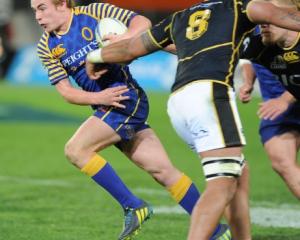Match income has dropped by more than 50% for provincial unions over the past five years and the current structure brings into question the future viability of the game at the semi-professional level, a report by Deloitte says.
The 16-page report, titled "State of the Unions", was a study look by a couple of partners at the financial advisory firm into the state of the 14 unions playing at the ITM Cup level and their overall health.
Otago was one of the unions involved in the study and, not surprisingly, given its financial dramas over the past year, some of the numbers paint a grim picture.
Deloitte concluded that collectively revenues were falling and accumulated reserves are being eroded.
In the 2011 financial year, which was affected by a condensed ITM Cup and the World Cup in New Zealand, revenue for the 14 unions was a combined $68 million, down from $77 million in 2010.
In 2007 it was $84 million.
Match-related revenues, such as gate takings and hospitality, have dropped by more than 50% in the past five years, going from $21 million to $9 million.
On average two-thirds of income for unions was generated via grants and sponsorship, grants from the New Zealand Rugby Union and other providers, such as gaming operators and trusts.
Unions have realised their incomes are dropping and have cut costs across the board but collectively across the 14 unions an operating profit has not been made in the past five years.
Otago's last two years do not make easy reading.
It went from being the fifth-highest ranking union in terms of revenue in 2010 to ninth-highest last year. Southland, Hawkes Bay, Taranaki and Bay of Plenty, along with the four other Super rugby based unions were all ahead of it. Revenue dropped by more than a third for Otago from 2010 to last year.
Otago, Manawatu and Waikato were the only unions which recorded negative equity for both the 2010 and 2011 years.
The report said the low equity positions of a number of unions, suggest that one poor operating year could jeopardise the ability of the unions to continue to operate as a going concern.
That is exactly what happened to Otago in 2011, as its revenue shrank by more than $2 million.
It faced liquidation earlier this year before a rescue package was organised, which saw it remain in business.
It had slashed player costs and set a conservative budget for the coming year as it starts to climb out of the financial bind.
The report concludes generating additional income from endorsements and sponsorship is undoubtedly difficult in the tough economic times.
There had to be some innovation to get people back to games. A relatively small increase of 500 spectators at every ITM Cup game played last year, paying $20 each, would have collectively eliminated all the deficits acquired last year by the unions.
The importance and responsibility of the provincial game and its contribution to the success of national teams could not be overlooked, the report said.






